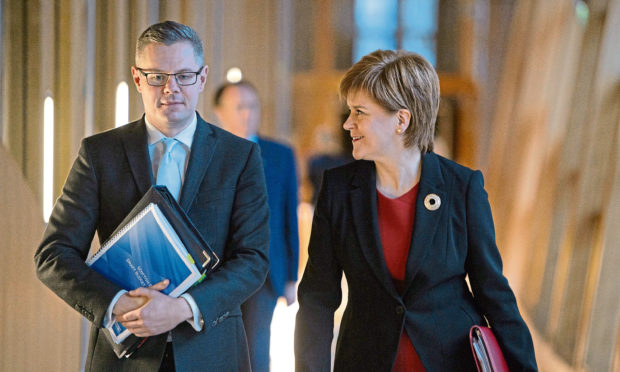Derek Mackay, the SNP’s finance minister, thinks if he keeps blaming Scotland’s problems on Brexit they will go away. As he prepares to deliver his budget in the Scottish parliament today, he will be hoping the chaos over Europe will serve as a distraction from his own predicament.
But his boss, Nicola Sturgeon, has tried for two years to convert Scots’ discontent over leaving the EU into support for her government, only to find that people are not that gullible.
Mackay, who faces a struggle to get his financial plans through Holyrood, has spent the past two days warning that Scotland’s future prosperity is at risk because of Brexit, and businesses, communities and families will suffer.
The subtext is that events out of his control are the issue here, but this year the Scottish government is in a very good position to sort out voters’ concerns closer to home.
While no one would argue that this week has seen Westminster at its fractious worst, most Scottish households are more likely to be anxious about impending tax rises that set them apart from the rest of the UK.
People here may be deeply disappointed by the way Brexit has been handled, but it remains a distant grievance compared to the more immediate complaints on their doorsteps.
These include shortcomings in the public services their taxes are supposed to fund, such as primary health care, schools, housing and transport.
SNP ministers have long used the excuse of Tory cuts in London for failing to provide adequately on just about all domestic fronts.
But in today’s budget there can be no dodging their devolved responsibilities. Official figures show that Scotland has been handed a windfall from the UK Treasury to the tune of £1.6 billion.
This is the third biggest payout by Chancellor Philip Hammond next year, after increases in spending on the NHS and transport, with an extra £1 billion for day-to-day revenue spending under the Barnett Formula, plus another £600 million to invest in building and infrastructure projects.
The nationalists will, of course, be reluctant to acknowledge this largesse from a Conservative treasurer, preferring to stick to the script of their Brexit mantra. But the electorate will want to see the benefits in their pockets, or in local authority services, which have been run down by more than 10 years of SNP rule.
How Mackay spends the money depends on which party he strikes a deal with to get his budget passed.
This has typically been the Greens, but this year their leader, Patrick Harvie, is demanding an overhaul of council tax that would impose punitive charges on bigger properties.
The Scottish Tories are urging Mackay to restrain from bumping up income taxes again in Scotland, arguing he now has enough resources without having to bleed the middle classes further.
Murdo Fraser, the shadow finance secretary, said: ‘The SNP has become a ‘pay more, get less’ government. With the budget this week, that must end.’
But his plea is bound to fall on deaf ears, and Mackay has already signalled he favours a new income tax hike.
Labour is asking for what it describes as ‘a radical plan’ to lift Scottish children out of poverty. The party’s shadow finance spokesman, James Kelly, has put forward anti-austerity proposals, and called on Mackay to use Scotland’s powers for a ‘real change in direction’ in this budget.
The SNP has been seeking cooperation with Jeremy Corbyn’s ultra-left Labour Party over Brexit. Sturgeon has made two recent trips to try to forge a pact with the Labour leader, the goal being to cause as much damage as possible to Theresa May.
But in Scotland, the nationalists seem less willing to enter into an agreement with Labour MSPs over spending. So what about the Lib Dems? All they have asked for, in return for supporting Mackay’s budget, is that the SNP takes independence off the table, even temporarily.
This is a very reasonable request from Lib Dem leader Willie Rennie, and one echoed by the Scottish Tories.
In the confusion over Europe, the last thing Scotland needs is more constitutional upheaval, and voters have made quite plain their distaste over revisiting the 2014 referendum.
This would also cost Mackay nothing, in financial terms at least. But it is the one giveaway he will not give away.
To abandon the independence campaign now, while good for the country, would diminish Sturgeon in the eyes of her grassroots support.
Her entire strategy over the EU has been a ploy to resurrect the separatist dream, however hopeless that is, and she would rather plunge Scotland’s finances into the abyss than lose face.


